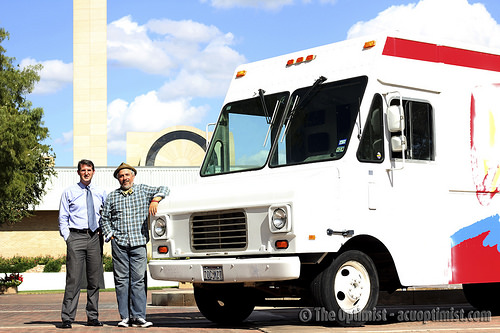A multidisciplinary food truck initiative headed by Dr. Stephen Johnson, the dean of the graduate school, and designed by Nil Santana, director of the MakerLab, recently partnered with PepsiCo Inc. to eliminate a food desert in south Dallas.
Johnson and Santana desire to create a graphically-robust vehicle for educating the south Dallas community on healthy eating habits and the importance of health-conscious food choices. PepsiCo Inc. donated the food truck to ACU students and the PepsiCo Foundation provided a grant to fund the project. Johnson highlighted the collaboration between PepsiCo Inc., ACU CitySquare and the MakerLab to tackle a problem in south Dallas, as an example of the school’s mission to impact the world.
Hayden Walker, junior graphic design major from Bridgeport, said, “I’m excited about the project, it’s really cool to be able to impact kids in this way. It’s fun, it’s creative, and hopefully it makes a splash in the lives of these kids.”
Walker expects his duties will pertain to the design of the truck’s exterior. He said, “As far as I know, the main designing that will need to be done will be wrapping the truck with some type of image and signage.”
Nil Santana invited Walker to assist with the design. Santana is facilitating the design of the truck through the MakerLab.
“We will facilitate the design thinking methodology, where students will be able to come up with solutions, learn to prototype quickly, test them, and, if needed, continue to iterate them,” said Santana.
Dr. Stephen Johnson, the visionary, emphasized the food truck’s purpose would not be food delivery, but instead, education. He envisions an eye-catching mobile learning truck that will allow the community of south Dallas to learn through touch and experimentation.
Johnson said the ACU CitySquare students, while exploring urban poverty, came across the problem of food access.
“In certain neighborhoods there’s no grocery stores, there’s no healthy food options. There are only corner markets, where you can get the stuff you get at 7-Eleven,” he said.
The lack of public transportation coupled with the lack of healthy food options, created a food desert in south Dallas that stared Johnson and the ACU CitySquare students right in the face. As instances of diabetes and hyper tension mounted, students discovered that access to healthy food options was not enough. The students realized that the community must be educated on the importance of healthy food choices and, more importantly, how to utilize them.
Stephanie Fink, senior 2D art major from Fayetteville, Georgia, said, “We are looking to use the food truck to interact with the children and adults in the neighborhood, bring in fresh vegetables and fruits from farmers markets, and teach the community how to prepare them.”
Santana said the goal for this fall is design, ideation, and prototyping, capped by the implementation of their designs. The spring semester will be devoted “to immersive contact with the community,” he said.
They are still in need of more students to assist in the initiative. Johnson said the project will be a team honors contract in the fall, though they hope to explore the colloquia path for the spring.

